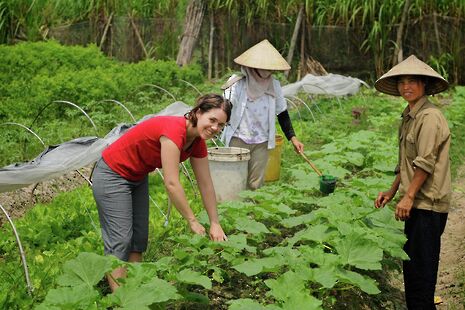Sifting ethical travel from voluntourism
Volunteering abroad isn’t always the noble deed it’s made out to be – find out how to do it the right way

A lot of us enter the uncharted waters of Freshers’ Week with a post-school fear of social pariahdom. The much-mocked ‘gap yah’ is usually avoided as an ice breaker for this very reason; invariably provoking a few eye-rolls, it’s the butt of numerous jokes on the cliché of the student voluntourist, that person wearing harem pants who found themselves while saving elephants in South East Asia. But volunteering abroad should not be laughed away as a gap year rite of passage. It can be hugely enriching, exhilarating and educative. Becoming involved with international efforts to tackle poverty and promote sustainable development around the world not only creates a more informed perspective from which to view our own lives, but can also direct positive future change.
Volunteering abroad should not be laughed away as a gap year rite of passage
However, before I continue to sing its praises, voluntourism’s myriad problems must be addressed. When gone about in questionable ways or for questionable motives, it can do more harm than good. Many have pointed to the ethical issues raised by Western volunteers who, roused by strategically marketed images of hungry children, seek to ‘change lives’ over the course of a few weeks by temporarily renouncing their own lives of privilege. Travel companies are guilty of capitalizing on this lucrative altruistic impulse. Expensive volunteering packages promise to make participants feel good about themselves by helping the disadvantaged, but with deluxe all-inclusive deals, adventure trips and guided tours thrown in. Marketing techniques can also perpetuate notions of a developing world critically reliant on supposedly selfless Western saviours. The practical difficulties of achieving change are often romanticised by quick-fix clickbait: ‘Make a difference! Feel great!’
The awful upshot of this is that volunteering can exacerbate the problems it seeks to alleviate. Taking selfies with orphaned children for social media kudos disguises the psychological trauma done to those children by forming emotional attachments to volunteers, only to be abandoned. In Cambodia, desperate parents give up their children to commercial orphanages created for the specific purpose of providing tourists with their Westernized vision of third-world hardship in the flesh.
In a time of widespread xenophobia, forming cross-cultural connections has never been more important
But by no means does this make all volunteering an egotistical, unethical travel choice. In a time of widespread xenophobia with borders being rapidly shut off, forming cross-cultural connections has never been more important. It’s easy to simplify global humanitarian issues from the comfort of our own homes, but by working in a developing country, our awareness of what’s really at stake increases and can be passed on when we return. Companies should provide realistic, transparent and accountable statements of long-term goals and how much difference they expect to make, taking sustainability, the involvement of local people and the needs of beneficiaries into consideration. In these circumstances, volunteering in practise can be as wholly positive as it is in theory.
Before you leave:
Firstly, ask yourself the hard questions. Why is it exactly that you want to volunteer abroad? Are you looking for self-gratification or do you genuinely want to help? It’s not wrong to be motivated by both considerations but do your research to find a group that will put you to good use. Don’t be lured in by tourist traps; be wary of a lack of detailed information and send out enquiry emails if a company’s website isn’t making their policies clear. The best organizations will be those who work in direct partnership with local communities, not just applying top-down schemes but taking the time to get to know individuals in order to make the most impact. With this in mind, try and commit to the project for as long as you can, at least two weeks and even longer if possible, so you have time to learn any new skills and can contribute to the best of your ability.
The project itself:
Rather than opting for a scheme that heroizes the ‘noble’ intentions of a volunteer and makes abstract feel-good promises, count on your own enthusiasm and engagement for an incredible experience. Realistic expectations are key: no, you cannot end the world’s hunger crisis in a fortnight. What you can do is support small-scale efforts as part of a much bigger movement towards positive and sustainable change. Many volunteers travel on their own and meeting new friends from all over the world is part of the joy of travelling in general. With voluntourism, building lasting relationships with people in host communities is just one of the reciprocal, long-term benefits of this type of travelling, promoting the exchange of different cultural traditions.
The aftermath:
Your involvement need not and should not be promptly curtailed upon arriving home to a comfortable bed, hot bath and well-stocked fridge. We’ve all been there at parties: speeches on the transformational nature of an authentic travelling experience is habitually a conversational turn-off. However, asking your project coordinators for tips on how to continue helping and raising awareness is a great idea, whether through online petitions, fundraising schemes or becoming an ambassador for the project to help get more volunteers involved.
 News / Clare Hall spent over £500k opposing busway 24 December 2025
News / Clare Hall spent over £500k opposing busway 24 December 2025 News / Caius mourns its tree-mendous loss23 December 2025
News / Caius mourns its tree-mendous loss23 December 2025 Comment / The ‘class’ of Cambridge24 December 2025
Comment / The ‘class’ of Cambridge24 December 2025 Comment / Yes, I’m brown – but I have more important things to say22 December 2025
Comment / Yes, I’m brown – but I have more important things to say22 December 2025 Interviews / Politics, your own way: Tilly Middlehurst on speaking out21 December 2025
Interviews / Politics, your own way: Tilly Middlehurst on speaking out21 December 2025









